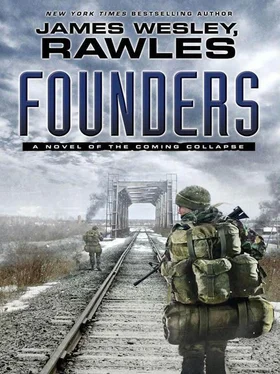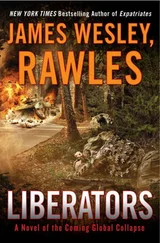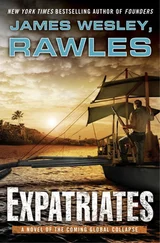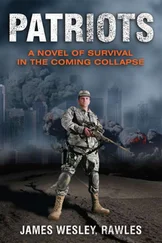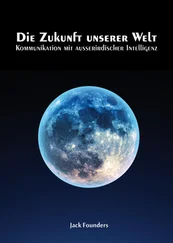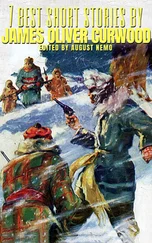James Rawles - Founders
Здесь есть возможность читать онлайн «James Rawles - Founders» весь текст электронной книги совершенно бесплатно (целиком полную версию без сокращений). В некоторых случаях можно слушать аудио, скачать через торрент в формате fb2 и присутствует краткое содержание. Город: New York, Год выпуска: 2012, ISBN: 2012, Издательство: Emily Bestler Books, Жанр: sf_postapocalyptic, на английском языке. Описание произведения, (предисловие) а так же отзывы посетителей доступны на портале библиотеки ЛибКат.
- Название:Founders
- Автор:
- Издательство:Emily Bestler Books
- Жанр:
- Год:2012
- Город:New York
- ISBN:978-1-4391-7282-7
- Рейтинг книги:5 / 5. Голосов: 1
-
Избранное:Добавить в избранное
- Отзывы:
-
Ваша оценка:
- 100
- 1
- 2
- 3
- 4
- 5
Founders: краткое содержание, описание и аннотация
Предлагаем к чтению аннотацию, описание, краткое содержание или предисловие (зависит от того, что написал сам автор книги «Founders»). Если вы не нашли необходимую информацию о книге — напишите в комментариях, мы постараемся отыскать её.
Founders — читать онлайн бесплатно полную книгу (весь текст) целиком
Ниже представлен текст книги, разбитый по страницам. Система сохранения места последней прочитанной страницы, позволяет с удобством читать онлайн бесплатно книгу «Founders», без необходимости каждый раз заново искать на чём Вы остановились. Поставьте закладку, и сможете в любой момент перейти на страницу, на которой закончили чтение.
Интервал:
Закладка:
Terry answered, “We didn’t realize that we’d entered city limits.”
“You haven’t yet, but you will be if you cross this street.”
Terry countered, “Well, can’t we just unload our guns and just pass through?”
“No, then you’d be in violation of the City Council’s emergency order on vagrancy. Mayor Nordyke said there are no exceptions. He laid down a zero tolerance policy for any outsiders unless they’re invited here by relatives.”
Ken shook his head in disgust, and said, “We’re not vagrants. We’re just travelers exercising our right of way. Can I show you a letter of introduction?”
The officers took a few minutes to read the letter. It seemed to soften their attitude considerably.
Handing the letter back to Terry, the older cop eyed his partner and said, “Okay, we’ll just escort you out of town, and you can be on your way.”
Terry asked, “In your car?”
“No, afoot. Can’t spare the gas.”
Ken replied, “Okay, whatever you say. Your town, your rules.”
They turned off the spotlight and locked their cruiser.
The officers fell in behind Ken and Terry and they resumed walking. Ken noticed that the officers still carried their shotguns, albeit casually. They chatted somewhat nervously as they walked. The officers talked about the many close calls they’d had since October, and the many crime scenes that they had cleaned up. Just forty officers, bolstered by a new “posse” of mostly military veterans and a few retired lawmen that numbered more than 100, they said, policed the town of 26,000. The older officer mentioned that there had been more than 800 burglaries and 70 violent home invasions. He hinted that there had been some summary executions of the perpetrators. They warned the Laytons to avoid Des Moines and Omaha—describing them as scenes of chaos and starvation. The younger officer mentioned that with the currency now worthless, they had been paid wages in corn, adding, “We’re all pretty sick of corn.”
They reached the far side of the Marshalltown limits in just seven blocks. The older officer said, “This is where we part company. We wish you the best of luck. But if we see you back in town, you will be arrested. Is that clear?”
“Yes, officer, abundantly clear.”
Once they were back in farmland, Ken commented, “They looked pretty lean, for cops.”
“Well. You make a cop walk most places instead of drive, and take away his supply of donuts…” Terry joked.
Ken finished her sentence, “…and he just might start looking athletic.”
They pressed on in the direction of Ames, Iowa. After their experience in Marshalltown, they avoided towns altogether. This often required lengthy circumnavigations. As the spring turned to summer, Ken and Terry saw fewer and fewer motor vehicles in operation. The little gasoline left was obviously being preciously guarded.
Following the advice of the Marshalltown police, they swung far around Des Moines and Omaha. From the vicinity of Ames, they walked another 650 miles west and slightly north, skirting far around Sioux City and Sioux Falls. Because of their stealthy “TABbing,” they averaged only four or five miles a night.
They would occasionally find places to barter some of their handful of silver coins for food. But often, they would eat gleanings. Sometimes they would have the chance to shoot a rabbit or a pheasant on the ground with Terry’s CAR-15 or with their .45 pistols. Twice, they were lucky enough to find deer to shoot. On each occasion, they spent three days camping in one place, gorging on venison and making jerky. They even cooked and ate the marrow from the large bones. And in both instances they were careful to bury the bones and gut piles so that their camp would not attract the attention of scavengers. In all, their hunting consumed only thirty-one cartridges that spring and summer. They didn’t pull the trigger unless a single shot was absolutely sure to “bag a critter.”
In late July and early August, they found three weeks of work harvesting pears, strawberries, and raspberries in Mission Hill, just east of Yankton, South Dakota. They were paid 25 cents in pre-1965 silver coin per day, plus one hot meal per day, in exchange for ten-hour days of hot, sweaty harvesting work.
The farm owner offered to keep their packs and rifles safely locked in his guarded house each day. This was the first time in nearly a year that they didn’t have their rifles in their hands when they were outdoors. Ken and Terry felt practically naked, carrying just their .45 automatic pistols.
It was in Mission Hill that they also first started trading with Yankton Sioux. They traded two deer hides, seven rabbit pelts, and three pheasant pelts for some antelope jerky, bar soap, and salt. The natives proved hospitable, easygoing, and fair traders. But it was obvious that they were desperately poor. Ken’s comment to Terry was “They were poor before the Crunch, but now all they have left is their pride.”
14. In the Footsteps of Josephus
“There are certain principles that are inherent in man, that belong to man, and that were enunciated in an early day, before the United States government was formed, and they are principles that rightfully belong to all men everywhere. They are described in the Declaration of Independence as inalienable rights, one of which is that men have a right to live; another is that they have a right to pursue happiness; and another is that they have a right to be free and no man has authority to deprive them of those God-given rights, and none but tyrants would do it. These principles, I say, are inalienable in man; they belong to him; they existed before any constitutions were framed or any laws made. Men have in various ages striven to strip their fellow-men of these rights, and dispossess them of them. And hence the wars, the bloodshed and carnage that have spread over the earth. We, therefore, are not indebted to the United States for these rights; we were free as men born into the world, having the right to do as we please, to act as we please, as long as we do not transgress constitutional law nor violate the rights of others…. Another thing God expects us to do, and that is to maintain the principle of human rights…. We owe it to all liberty-loving men, to stand up for human rights and to protect human freedom, and in the name of God we will do it, and let the congregation say Amen.”
—John Taylor, 1882, Journal of Discourses , Volume 23, p. 263Muddy Pond, Tennessee
July, the Second Year
Life in Overton County was just starting to get back to normal when the first Provisional Government units passed through. Since the town was within the four-hour-drive-time local security radius of Fort Knox, Muddy Pond was in one of the first areas to be pacified by the ProvGov. The new administration at first seemed well intentioned and benevolent, but people soon saw its sinister side.
The nationalization programs and the controls began gradually. At first, the ProvGov seized only key industries and utilities. But later, smaller companies were taken over, some seemingly on a whim. People wondered why a padlock manufacturing company would be nationalized. And why would a silver refinery have to be nationalized?
Likewise, the wage, price, currency, and credit controls started small, but gradually grew to gargantuan proportions. Just a month after the ProvGov troops arrived, there was a dusk-to-dawn curfew, with shoot-on-sight orders for violators. But even daylight hours weren’t safe, as Ben Fielding discovered.
Early one afternoon, all of Ben’s family except Joseph was at home listening to some Messianic music on Rebecca’s iPod dock. They often gathered in the living room to do so, on the days that the power was on. The children liked to hear the music played loudly, and they sang along and danced. Their fun was interrupted when they heard some long bursts of automatic weapons fire close by their house. They looked out their living room window and saw a convoy of UNPROFOR coalition vehicles strung out for a quarter mile on the county road. The trucks and APCs had stopped and turned out onto either side of the road in a herringbone pattern. The wild firing continued for thirty seconds. They heard a few shots hit the roof of their house. The firing finally stopped when the convoy commander in the lead Marder APC repeatedly honked his horn.
Читать дальшеИнтервал:
Закладка:
Похожие книги на «Founders»
Представляем Вашему вниманию похожие книги на «Founders» списком для выбора. Мы отобрали схожую по названию и смыслу литературу в надежде предоставить читателям больше вариантов отыскать новые, интересные, ещё непрочитанные произведения.
Обсуждение, отзывы о книге «Founders» и просто собственные мнения читателей. Оставьте ваши комментарии, напишите, что Вы думаете о произведении, его смысле или главных героях. Укажите что конкретно понравилось, а что нет, и почему Вы так считаете.
